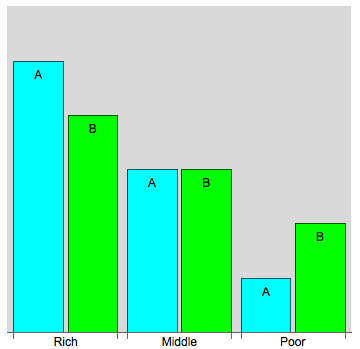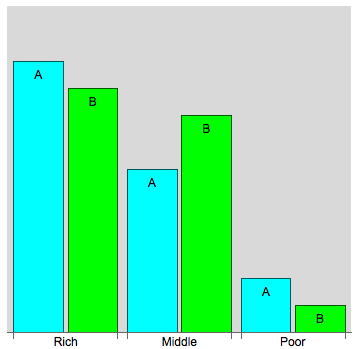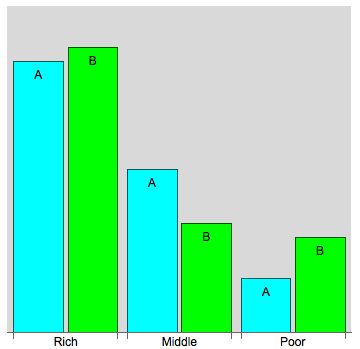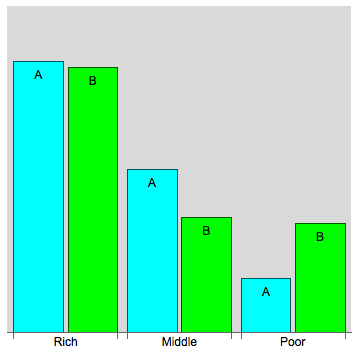Quasiprogressivity
The word “progressive” is used in all kinds of ways. I’m not interested in the term as a label of people. I won’t even self-identify as “a progressive” (or almost any other thing), even though I often find myself making common cause with people who do. I’ll leave arguments about who is a progressive to others.
One frequent use of the term “progressive” is to refer to the distributional effects of an arrangement or policy. The income tax is “progressive” because it takes more (in absolute terms and in percentage terms) from high earners, thus reducing after-tax income inequality. A carbon tax, it is often claimed, would be regressive, because the poor spend a high fraction of their incomes on heating and transportation than the well-off, who therefore pay less (in percentage terms), accentuating after-tax income inequality.
It is easy to forget, in these kinds of conversations, that “progressivity” is not scalar. Policies cannot be ordered by their progressivity, because most nontrivial policies make different groups of people better off and worse off in ways that don’t monotonically map across the income distribution.
Let’s look at a few charts to make this clear. In all of our hypersimplified drawings, the x-axis will define three groups, which we’ll call “poor”, “middle”, and “rich”. For our purposes, it matters not at all whether we are talking about income, wealth, health, or ponies. There is some good thing and two alternative arrangements. We can think of one arrangement as the status quo and another one as a proposed new policy. Or we can think of both arrangements as hypotheticals we are considering and comparing.
Let’s first look at an example under which one alternative is plainly more progressive than the other:
Arrangement B is plainly more progressive than Arrangement A. The distribution of, um, ponies is more equal across the distribution. Both the rich and the poor are brought towards the middle.
However, suppose we are evaluating the following two policies for their relative “progressivity”:
Very few people would, I think, describe Arrangement B as “more progressive” than Arrangement A, because Arrangement B clearly screws the poor. The term “progressive” is garlanded with moral connotations about helping the poor, so this would not qualify. However, Arrangement B does include a transfer from the rich to the middle, and it reduces the inequality between the rich and the middle substantially. If your definition of progressive is “redistributes from richer to poorer”, you cannot definitively order one arrangement as more or less progressive than the other.
One might describe a proposal to go from Arrangement A to Arrangement B as “insider-outsider egalitarian”. It is not an irrelevant case. Although historical experience suggests they are mistaken, people who oppose unions frequently argue that they have precisely this effect. A better-off, unionized portion of the workforce, in this story, sees wages increases, at the expense of wealthy owners and managers (who have to pay unionized workers more), but also at the expense of the not-unionized (or not-employed) portion of the workforce, who see wages stagnate and prices rise.
While “insider-outsider egalitarian” is not an irrelevant case, it is not an ethically confusing one either. Holding constant the identity and the ordering of the humans, very few people explicitly argue that screwing the poor for the sake of egalitarianism among insiders is a good thing. Arguing that this will be the effect of a policy is a way of opposing it. (When identities are not held constant, the moral intuitions become less clear. Suppose under Arrangement B the poor are new immigrants whose poverty masks a great improvement relative to circumstances in their home country?)
Let’s consider a third case:
This is the case I want to call quasiprogressive. Again, if our definition of “progressivity” is redistributing from richer to poorer, we can’t rank Arrangement A against Arrangement B. Going from Arrangement A to Arrangement B, ponies flow in both directions, to the poor, sure, but also to the rich from the middle. Nevertheless, people are tempted to call a shift to Arrangement B “progressive”, because it is good for the poor. Our ethical intuitions about this change may be positive. Or we may describe it negatively, call it a “hollowing of the middle class”. Is it a vase or a love affair? Suppose that a trade agreement will put middle-class workers in developed countries in competition with low wage workers elsewhere, leading to both a decline of middle-class wages and a proliferation of cheap consumer goods. The poor will benefit from cheap stuff, the rich will benefit from cheap stuff and cheap help, but the middle class will get screwed. Should we call this agreement “progressive” or “regressive”? Taking into account only domestic welfare, would it be a good thing or a bad thing?
If our only choices are Arrangement A and Arrangement B, we might be tempted to dispel once and for all with this fiction that Barack Obama doesn’t know what he’s doing. Short circuit. It doesn’t compute. Do we screw the poor or gut the middle class?
Fortunately, those are our choices only if the space of available policies is constrained artificially. In reality, our decision space usually looks more like this:
The black bars in this chart represent the status quo. We are decided to enact a reform. Shall we jump to Arrangement A or Arrangement B? Absent political considerations, most of us would go for A. But suppose, not implausibly, that an ideological and institutional apparatus exists whose function is to defend the material interest of the wealthy? Then perhaps only Arrangement B will seem “politically possible”. Since Arrangement B does help the poor, it may seem unethical not to take it. If (as is usually the case) the harms to the middle are indirect — no one will “take” anything from anyone, market forces will do the dirty work — wealthier people of good will be tempted to support the reform. They stand to lose nothing, and maybe to gain something. The poor will be made better off! Harms to the middle will seem hypothetical, and in any case will amount to just desserts adjudicated by an impersonal market. Didn’t Rawls tell us that the welfare of the poorest should be our touchstone? Less wealthy people of goodwill may not be so sanguine about the reform. They may be torn. When a union member opposes a trade agreement that she understands will lower prices on many goods, but that also might put her out of a job, is she fighting the good fight for the middle class, or is she just a special interest screwing others to preserve her place at the trough? So long as Arrangement A is off the table, it will be very hard to mount an effective opposition to accepting Arrangement B, which after all benefits the poor so greatly.
Policy changes all the time, and the circumstances that favor reforms that look like Arrangement B over those that look like Arrangement A are permanent. Since wealth and influence correlate, each accommodation tilts the political economy towards the next capitulation. A weaker middle is less and less capable of opposing quasiprogressive alternatives that look both desirable and virtuous to the rich. In a world where the wealthy are genuinely interested in helping the poorest off but also vigilant caretakers of their own interests, quasiprogressive solutions are a political-economic sweet spot. The only way to prevent this dynamic without actively screwing the poor is to fight for solutions that work for the poor without sacrificing the middle. Those solutions will always be politically challenging. Even where a policy change is “positive sum”, as trade agreements are argued to be, policymakers almost unconsciously gravitate towards arrangements that segregate benefits towards the powerful rich and the sympathetic poor but shift burdens towards the less salient, less powerful middle.
This sounds very abstract, so let me name some examples where I think the American polity has chosen quasiprogressive solutions. We’ve talked about trade. The choice of quantitative easing rather than fiscal policy to stimulate the economy at the zero-lower-bound is another example. QE-assisted asset-price rises undoubtedly helped people at the margins get or keep their jobs while they also helped wealthy assetholders. Fiscal stimulus would have helped the marginally employed at least as well and might have put pressure on middle class wages too. But bonds might not have performed so well. The bank bailouts of 2008-2009 are frequently justified on quasiprogressive terms. Surely, had there been a catastrophic financial collapse, the poor would have suffered most of all! Of course they would have. They always do, that is the essence of poverty. But we might have averted a financial collapse with transfers to underwater homeowners, for example, or to be more fair, with helicopter money for everyone. Instead, we let middle-class homeowners collapse into negative equity and, too frequently, foreclosure, even as we provided generous support and regulatory forbearance to ensure that financial institutions and their creditors would be made whole. Most of the fiscal stimulus came not from Obama’s headline $800B program, but via automatic stabilizers that kick-in for the poor and unemployed. We rescue the rich. We congratulate ourselves for paying so much to help the stigmatized, traumatized poor. We tell the middle to suck it. That’s the quasiprogressive way, and it’s at the heart of American political economy.
Let’s do one more chart.
Which one, Arrangement A or Arrangement B is more progressive? If our definition of “progressivity” is redistributing from richer to poorer, we absolutely can rank a shift between these two arrangements. Going from Arrangement A to Arrangement B is clearly progressive. Ponies are shifted from both the rich and the middle to the poor.
So should our moral intuitions applaud this change? I don’t think so. I call this one “token progressivity”. While helpful to the poor, a transition from Arrangement A to Arrangement B extracts a small concession from the wealthy but burdens the middle disproportionately.
A lot of conversations bog down into arguments over whether the effects of some event were quasiprogressive or token-progressive. It just doesn’t matter very much. Uniformity of the direction of altered outcomes is too simplistic a criterion to rest moral intuitions on. A society is more than a summation of hypothetical utilities. The shape of the distribution of ponies matters as well. If we want to live in a middle class society, we have to fight for policies that protect the middle class. If we content ourselves with a progressivism of the politically achievable, we may find ourselves torn between doing nothing at all or celebrating accomplishments that may genuinely help the poor, but at the expense of an erstwhile middle class on a path of downward convergence. The work of good policy lies more in expanding the menu of choices than in optimizing over what is straightforwardly achievable.
At this particular moment, I want to emphasize “expanding the menu” needn’t mean preferring single-payer healthcare to reforming ObamaCare, or preferring universal free tuition over means-tested financial aid. But it is an implication of this analysis that the centrist acceptance of net budgetary impact as a criterion for valuing programs — where “net” means net of user fees like insurance premiums or tuition contributions — deserves special scrutiny. The first question should always be “value for the money”. Regardless of how a program will be financed, are the goods to be purchased worth the opportunity cost of the resources that will be expended? If we decide that a program is worthwhile, we then face a political trade-off. The smaller its net budgetary impact, the easier our program will be to pass. However, every shift in financing from general revenue towards means-tested user fees moves us precisely along a path from progressive, to token-progressive, to quasiprogressive, as defined in the discussion above. There are sometimes colorable reasons for user fees, besides political expedience. User fees can address fairness concerns about programs whose benefits aren’t universally available and yield few positive spillovers. Importantly, program value may not be independent of fee-structure. For example, copays may discourage frivolous doctor visits, and so enhance “bang-for-the-buck” of expenditures overall. These are sometimes valid concerns, but they often serve as fig leaves for imposing fees just to reduce net budget impact. That is, they serve as politically motivated excuses to reduce the progressivity of programs in order to increase their burden on the middle class relative to counterfactuals under which the programs would be financed from general revenue.
Update History:
- 11-Feb-2016, 3:20 a.m. PST: “Holding constant the identity and
orderingsthe ordering of the humans”; “new immigrants whoserelativepoverty masks a great improvement relative to circumstances”; “They stand to lose nothing, and maybe to gain something.” - 18-Jul-2023, 12:35 p.m. EDT: Fix broken link (“not implausibly”) to Gilens and Page, 2014. Thanks Anna Gryshko.






“very few people explicitly argue that screwing the poor for the sake of egalitarianism among insiders is a good thing” – except when the poor are ‘not us’, when it will be the normal argument (see various hysterical border arrangements)
February 10th, 2016 at 2:44 am PST
link
You make a very valid point and have greatly expanded my vocabulary. Your explaination is very clear Yes, all we achieve these days is QuasiProgressism.
Thank you Mark Thoma for linking to this article, I too will be citing it…
February 11th, 2016 at 2:52 am PST
link
But how are the mice to bell the cat?
February 14th, 2016 at 1:02 am PST
link
Well said, as usual. I believe that the facts regarding income and wealth distribution support this view of what has been happening for the last 40 years or so.
If ever there was a time to break this cycle of faux progressivity, it is now. Sanders is seizing the moment and confounding the political experts, while the Republicans are in total disarray.
February 17th, 2016 at 1:13 pm PST
link
First, thank you, thank you, for an excellent presentation about real world type of trade offs.
However, your basic static analysis is hugely flawed. Because any policy in this period also has an effect on future periods.
The fundamental long term problem with socialism, as seen clearly in Venezuela as well as most heavily Democrat US states, is that the redistribution policy that seems best from distribution grounds for this period is always sub-optimal, and often negative, for future period total production.
Try expanding your analysis to include a 10% growth, a 1% growth, and a -5% growth, and after 4 periods check the absolute levels of product distributed to the poor. The high growth strategy will almost certainly result in better results for the poor in absolute.
I have no interest in helping poor folk who prefer to screw the rich rather than help themselves, so even if relative happiness goes down, if their absolute poverty goes down, that would be my preference. Along with an attempt at changing the culture to focus on increasing the absolute amounts that poor people earn over the long term.
And getting thru earning is better than from some gifting/ tax-taking.
Again, excellent tradeoffs. Please apply it over time.
February 20th, 2016 at 10:00 am PST
link
Enjoyed this post and have been thinking about it for days. The argument persuades me as long as it holds its frames of reference. For many domestic economies, the overburdened middle also happens to be inside the global 1%. Someone with their ear pressed up against the door could be forgiven for wondering whether the insiders blockading Arrangement B actually have a more cleanly progressive, top-burdening global economy as their endgame. Especially as the bargaining language of the progressives conveniently dovetails with fear of losing ponies to outsiders.
February 20th, 2016 at 3:03 pm PST
link